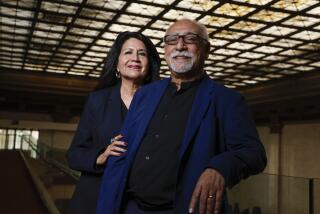Globe Sets Sights on Reviving Ancient Classics
- Share via
San Diego’s Globe Theatre, known largely for Shakespearean productions, is seeking to raise $2.5 million to create an Institute for Classical Theatre, which would bring ancient dramas to its stages every year.
Endowment income would help pay for an annual production of a Greek or Roman play or an adaptation based on the ancients. The institute also would sponsor symposiums, panel discussions and special fellowships related to the art of ancient theater.
“We’re committed to doing [ancient classics], and we want to bring resources to it to do it on a higher level,” said Douglas C. Evans, Globe managing director.
If a $2.5-million endowment were to yield a conservative 5% a year, Evans said, that money plus the budget the Globe normally allocates to each show in its 14-play season would yield about $275,000 to $350,000 a year for a production of ancient drama.
Since its founding in 1935, the Globe has staged more than 150 productions of Shakespeare plays and two by ancient Greeks: Sophocles’ “Electra” in 1984 and last year’s mounting of “The Trojan Women” by Euripides. But Jack O’Brien, Globe artistic director, says the Globe’s experience with Shakespeare--two of the plays each season on the Globe’s three stages are reserved for the Bard--positions it to burrow into another rich classic vein.
The Greeks, like Shakespeare, “are what we refer to often as ‘elevated text,’ ” O’Brien said. “It takes high skill, enormous technique and vocal command that contemporary drama doesn’t often demand. We have the chops for this, the audience for this and the sense of tradition to do it.”
The initiative is part of a larger drive to raise $50 million for the Globe, Evans said. He and O’Brien hit on the idea of a special institute for the ancients during the run of “The Trojan Women.”
Marianne McDonald, a UC San Diego professor of classics and theater, adapted and translated the text for that production, and the Globe is looking to McDonald to play a key role in the development of the institute. An heiress to the Zenith fortune, McDonald gave $1 million in 1971 to establish a UC Irvine computer database of Greek literature.
“Great classics give you reason for living,” she said. “I think all of theater is inspired by Greek comedy and tragedy. They are about the big issues.”
McDonald plans to host a gathering of about 50 area arts patrons at her home on March 19, when she and Globe officials will unfurl the concept of an institute for the ancient classics.
Other major Southern California resident theaters also have done little with the Greeks and Romans. The La Jolla Playhouse has staged just one ancient play since its 1983 reopening after a long dormant spell: Peter Sellars’ 1986 adaptation of Sophocles’ “Ajax.” The Mark Taper Forum in Los Angeles has mounted five ancient plays or modern adaptations since 1967, most recently Mary Zimmerman’s “Metamorphoses” last year. South Coast Repertory in Costa Mesa has presented just one, Aristophanes’ “The Birds,” since its founding in 1964.
More to Read
The biggest entertainment stories
Get our big stories about Hollywood, film, television, music, arts, culture and more right in your inbox as soon as they publish.
You may occasionally receive promotional content from the Los Angeles Times.











